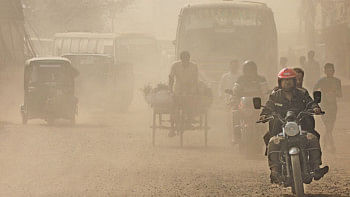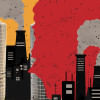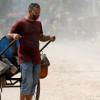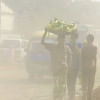Holidays: Dhaka’s air remains ‘unhealthy’

Dhaka ranked eighth on the list of cities with the worst air quality yesterday morning, recording an Air Quality Index (AQI) score of 135 at 9:40am.
Yesterday's air was classified as "unhealthy", indicating potential health risks, according to the AQI index.
Despite reduced traffic and public movement in the capital due to the Eid-ul-Azha holidays, the air quality remained unhealthy over the past few days, raising concerns about public health.
According to the AQI scale, when the value for particle pollution ranges from 50 to 100, the air quality is considered "moderate", where sensitive individuals are advised to limit prolonged outdoor exertions. A score between 101 and 150 is considered "unhealthy for sensitive groups"; between 151 and 200 is "unhealthy"; 201 to 300 is classified as "very unhealthy"; and anything above 301 is deemed "hazardous", posing serious health risks.
India's Delhi, Iraq's Baghdad, and Kuwait's Kuwait City occupied the top three spots on the list with AQI scores of 174, 157, and 153 respectively.
The AQI, a daily reporting index, informs the public about how clean or polluted a city's air is and the possible health implications.
In Bangladesh, the AQI is calculated based on five pollutants: particulate matter (PM10 and PM2.5), nitrogen dioxide (NO₂), carbon monoxide (CO), sulphur dioxide (SO₂), and ozone (O₃).
Dhaka has long struggled with air pollution. Its air quality typically deteriorates in winter and improves during the monsoon.
According to the World Health Organization (WHO), air pollution causes an estimated seven million deaths globally each year, mainly due to increased mortality from stroke, heart disease, chronic obstructive pulmonary disease, lung cancer, and acute respiratory infections.

 For all latest news, follow The Daily Star's Google News channel.
For all latest news, follow The Daily Star's Google News channel. 








Comments